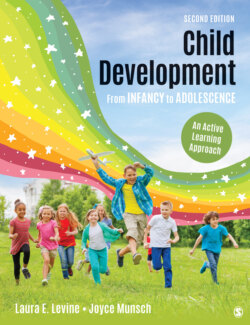Читать книгу Child Development From Infancy to Adolescence - Laura E. Levine - Страница 252
На сайте Литреса книга снята с продажи.
Becoming a Father
ОглавлениеMany changes also occur for a man when he learns that he is about to become a father. Most of these changes are psychological and emotional, but some men from different cultures around the world experience what anthropologists call couvade (Brennan, Marshall-Lucette, Ayers, & Ahmed, 2007). In ritualistic couvade, the man might feign contractions and labor pains at the same time the mother is in labor in an effort to distract evil spirits away from the mother so that she and the child will not be affected by them (Abraham & Hemavathy, 2015). In the industrialized world, a type of psychosomatic couvade occurs in which men experience some of the physical symptoms associated with pregnancy, including weight gain, nausea, indigestion, backaches, mood swings, and food cravings. In international studies, the estimate of how many men experience these symptoms varies greatly, from 11% to 97%, but clearly they occur in a significant number of men in a variety of cultures (Brennan et al., 2007).
Couvade: A sympathetic pregnancy in which a man experiences a variety of symptoms associated with pregnancy or childbirth while his partner is pregnant.
An expectant father expresses his emotional investment in the pregnancy by nurturing and caring for his partner. He can help her choose a healthy diet, encourage her to get enough rest and an appropriate amount of exercise, and support her as she deals with the emotional and physical changes of pregnancy. Many men accompany their partners to doctor’s appointments and/or childbirth classes. In one study of more than 4,600 couples in England, over half of the fathers were present at one or more of the prenatal visits, and almost all were present for the ultrasound examination (Redshaw & Henderson, 2013). Having good information about what is happening to his partner and learning how he can provide tangible assistance helps a man prepare for his transition into fatherhood (Boyce, Condon, Barton, & Corkindale, 2007).
Although some men say they felt marginalized and even unnecessary while attending childbirth classes (Kowlessar, Fox, & Wittkowski, 2015; Premberg & Lundgren, 2006) or during the birth itself (Dolan & Coe, 2011; Hanson, Hunter, Bormann, & Sobo, 2009), many are overcome with a powerful and perhaps unexpected rush of emotions following the birth of their baby (Erlandsson & Lindgren, 2009; Reed, 2005). The opportunity to see and hold their newborn in those early moments becomes a rich reward for the new father. New fathers also get a boost from hormonal changes that may be linked with fathering behavior. Throughout their partner’s pregnancy, expectant fathers show a decline in testosterone and estradiol, and men who had greater declines in these hormones were more involved with infant care and household tasks and were more supportive to their partners after the baby was born (Edelstein et al., 2017).
A new father is born. The transition to becoming a new father can be a powerful experience for men. A father’s role today involves much more than being the breadwinner for the family. Fathers also can be sensitive and nurturant caregivers for their newborn infants.
iStockphoto.com/toos
The expectations for a new father differ enormously from one culture to another. Some cultures strictly prohibit fathers and other men from taking part in the birth experience and early care of the baby, while in others they assume a major role in caring for young children. However, in many cultures women prefer to have their mothers rather than their husbands present at the birth (Abushaikha & Massah, 2012).
Ifaluk men are only allowed to see their newborn from a distance while the mother and baby stay in the birth house for the first 10 days. During this time, the father has two responsibilities: to provide the mother with fish to eat and to make a cradle for the baby. On the other hand, the Ifaluk mother hands over the responsibility of caring for the child to the father when the child is 2 years old, and he becomes the major caretaker for the next 2 to 3 years (Le, 2000). In a study conducted in England, Indian, Pakistani, and Bangladeshi fathers were significantly less likely to feed or change their newborn’s diapers than the other participants who were from the United Kingdom (Premberg & Lundgren, 2006), but this behavior is in keeping with their cultural traditions and expectations for how a new father should behave. Such cultural differences remind us that differences are not deficiencies. There is a wide range of parenting behaviors seen in different human societies and infants are well cared for in each of them.
